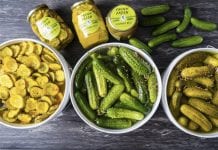By Allison Mowatt
Courtesy of Live Healthy Live Green

It’s hard not to be aware of the numerous health benefits eating organically has on the human body. Not only do you feel more energetic and sport a healthier complexion but you also build a stronger immune system, keeping colds and viruses at bay more so than if you ate a non-organic diet.
If eating an all natural diet can effect your body like this, imagine what it can do for your dog? Healthy pets make happy pets and we want the best for our furry friends who would do anything for us.
Many dog owners may wrestle with the decision whether or not they should go organic with their pet. Consider organic dog food’s numerous health benefits, which far outweigh the fact that organic pet food can be more expensive than non-organic.
Organic dog food is free of chemical additives, toxins, pesticides, artificial colors and flavor enhancers. Organically labeled dog food signifies the product was minimally processed and grown free of synthetic chemicals such as herbicides, insecticides, antibiotics and other additives. The United States has a National Organic Program (NOP) that produces, handles and labels organic products and the United States Department of Agriculture (USDA) regulates the organic certifications. There are three general levels of organics for humans and dogs suggesting the product is either 100 percent organic, 95 percent organic or 70 percent organic.
Essential vitamins and nutrients usually found in organic dog food are antioxidants like Vitamin E and selenium for healthy immune systems, a healthy fiber blend for easy digestion, omega fatty acids for healthy skin and a shiny coat, high quality proteins for healthy organs and lean muscle mass and calcium for strong bones and healthy teeth.
Studies have shown that dogs who are fed an all natural diet have less shedding, reduced skin ailments and allergies, increased energy levels, a healthy weight, fewer digestive disorders, stronger immunity, lower cancer rates and an overall better quality of life.
In addition, organic food has higher vitamin and nutritional levels than non-organic foods, which are chock full of preservatives. Due to the high nutritional levels and the lack of bulk fillers, animals eat less of it and are able to maintain a healthy weight, leaving them more energetic and able to exercise. Also, with easily digestible foods like oats and barley or human grade turkey, lamb or chicken, dogs are able to better absorb the nutrients required to maintain a healthy immune system.
You can purchase quality organic pet food at your local grocery store or you can always make your own homemade pet food so you know exactly what your dog is getting.
A common misconception is that dogs have to consume meat in order to be healthy and functioning, but this is not the case. “A dog can be a vegetarian and I know many that are and have lived long, healthy lives,” said Lisa Alexander, Certified Green Living Expert. “However, a cat is a true carnivore, which is an animal or plant that has to eat meat to survive,” she explained. “For example, the big cats in Africa, such as the lions, only need to eat a few times a month, but it is only meat they eat. In addition, humans are not carnivores unlike what most people think. We started life as gatherers only eating what nature grew naturally. Meat came later when we developed tools,” Lisa said.
Studies have shown that feeding your dog a meatless diet of rice, lentils and organic vegetables can prolong their life. With that in mind, once you’ve decided to go organic with your dog, you just need to figure out if your dog should have a vegetarian based diet or one that includes organic meats and if you want to make it yourself or purchase it at the store.
One of the most important nutrients other than protein and vegetables you should be on the lookout for when buying or preparing your own dog food is omega-3 fatty acids or essential fatty acids. One of the natural sources of omega 3’s is flax seed, which you can purchase in an oil form or whole seeds. According to Lisa, whole seeds are recommended since they don’t spoil as quickly as the oil.
You can grind the seeds in a coffee grinder and sprinkle them in your pet’s food, then store them in the fridge in an airtight container where it will keep for up to 30 days. According to Dr. Andrew Weil, who is known for popularizing the field of integrative medicine, flax seed is a powerful nutrient for dogs and humans and is a true aid against arthritis, cancer and other diseases. In addition, it helps keep fur shiny and healthy.
As with humans, once dogs begin eating organically, it’ll have a positive impact on how they feel, act and look. A diet rich in all natural foods will ensure a healthy and happy life for both you and your pet.














